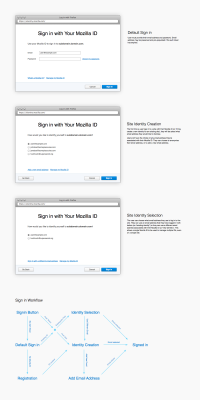Identity/Features/Web-based Verified Email Client: Difference between revisions
| Line 92: | Line 92: | ||
== Use Cases == | == Use Cases == | ||
Mark gets a tip from a friend about SaladFans.com, a place to review and share your favorite salad bars. Mark visits the site and is eager to contribute his own reviews as well as connecting with friends to find out which salad bars they like. | |||
Mark sees a "sign in" button on the SaladFans site, and when he clicks on it a Mozilla ID pop-up dialog comes up telling him that the site is asking for a verified email address to sign-in. Mark hasn't used Mozilla ID before, so he clicks the "register" button. | |||
Mark now types in his email address, and chooses a password for his account. After he's done, Mozilla ID tells him that a verification message has been sent to his email, and he needs to click on a link there before proceeding. Mark checks his email and clicks on the link in the message Mozilla ID sent him. The link opens up a new pop-up replacing the previous one, which welcomes him to Mozilla ID and asks him if it's OK to disclose the email address to SaladFans.com. Mark clicks OK, the dialog closes, SaladFans.com reloads, and Mark is now signed into SaladFans.com! | |||
Key Points: | |||
* Easy set-up from scratch | |||
* All HTML flow, works on a variety of browsers | |||
* Flow centered around verified email disclosure | |||
== Test Plans == | == Test Plans == | ||
Revision as of 16:41, 27 April 2011
| Feature | Status | ETA | Owner |
| Web-based Verified Email Client | Development in progress. | TBD | Dan Mills |
Summary
Pure HTML client of the Verified Email Service.
Related features:
Team
Who's working on this?
- Feature Manager: Dan Mills
- Lead Developer: JR Conlin
- Product Manager: Dan Mills
- QA: TBD
- UX: Chris Howse
- Security: Michael Coates
- Privacy: Sid Stamm
Release Requirements
| Item | Bug | Status |
| Relying party API | - | - |
| Sign-in pop-up | - | - |
| Email disclosure pop-up | - | - |
| Email verification pop-up | - | - |
| Account creation pop-up | - | - |
| Account creation UX polish[1] | - | - |
| HTML client popups support multiple emails | - | - |
| HTML client allows adding a new email to an existing account | - | - |
[1] e.g., password strength meter, pop-up auto-closes upon email verification
Next Steps
Open Issues
Related Bugs & Dependencies
Designs
API Docs
Future API spec (for reference):
Mockups
Other mockups (for reference):
Older mockups:
Use Cases
Mark gets a tip from a friend about SaladFans.com, a place to review and share your favorite salad bars. Mark visits the site and is eager to contribute his own reviews as well as connecting with friends to find out which salad bars they like.
Mark sees a "sign in" button on the SaladFans site, and when he clicks on it a Mozilla ID pop-up dialog comes up telling him that the site is asking for a verified email address to sign-in. Mark hasn't used Mozilla ID before, so he clicks the "register" button.
Mark now types in his email address, and chooses a password for his account. After he's done, Mozilla ID tells him that a verification message has been sent to his email, and he needs to click on a link there before proceeding. Mark checks his email and clicks on the link in the message Mozilla ID sent him. The link opens up a new pop-up replacing the previous one, which welcomes him to Mozilla ID and asks him if it's OK to disclose the email address to SaladFans.com. Mark clicks OK, the dialog closes, SaladFans.com reloads, and Mark is now signed into SaladFans.com!
Key Points:
- Easy set-up from scratch
- All HTML flow, works on a variety of browsers
- Flow centered around verified email disclosure
Test Plans
Goals
- Implement the JS API for sites to support Verified Email
- Not to interfere when native browser support is present
- Directly interface with the Mozilla Verified Email service for all functionality
- Support Verified Email on current-generation browsers: Firefox 4, IE 8, Chrome 10, Safari 5, Opera
- Build towards a fully distributed Verified Email system down the road (see Labs' Verified Email protocol)
Non-Goals
- Integrating with/implementing non-Verified Email auth protocols
- including HTTP Auth, forms-based sign-in, OpenID, OAuth, etc.
- Implementing fully de-centralized Verified Email support
- Support for other profile information
Other Documentation
Legend (remove if you like)
| Healthy: feature is progressing as expected. | |
| Blocked: feature is currently blocked. | |
| At Risk: feature is at risk of missing its targeted release. | |
| ETA | Estimated date for completion of the current feature task. Overall ETA for the feature is the product release date. |


